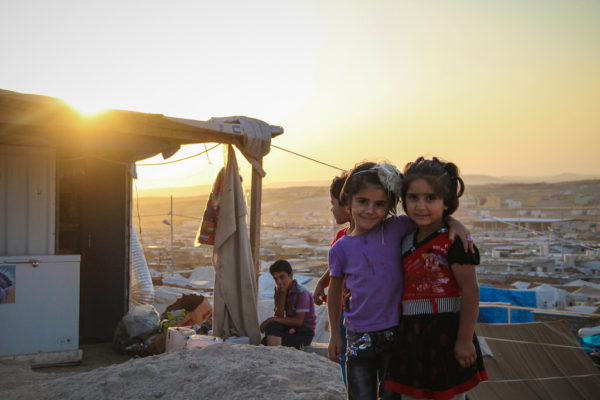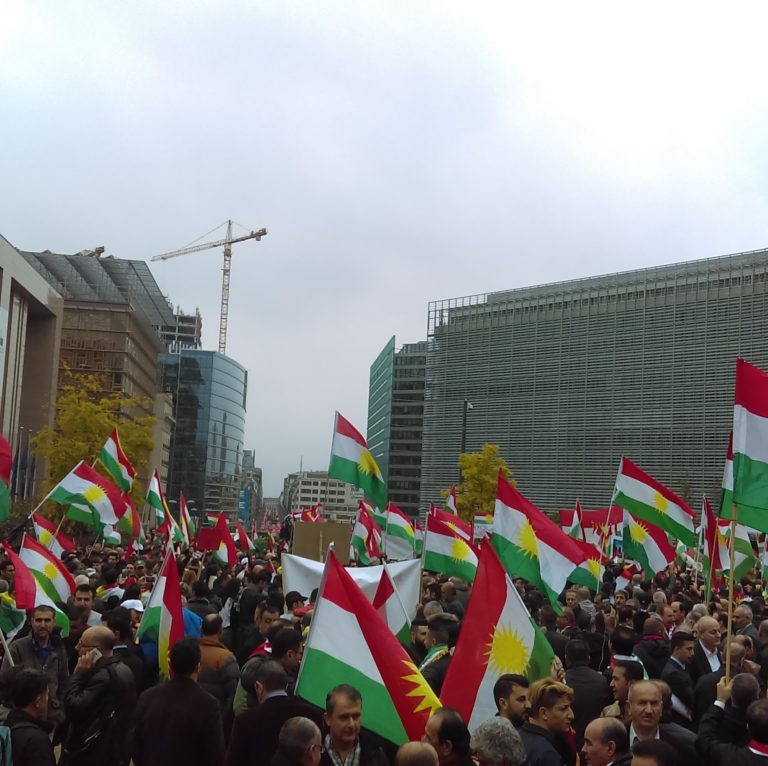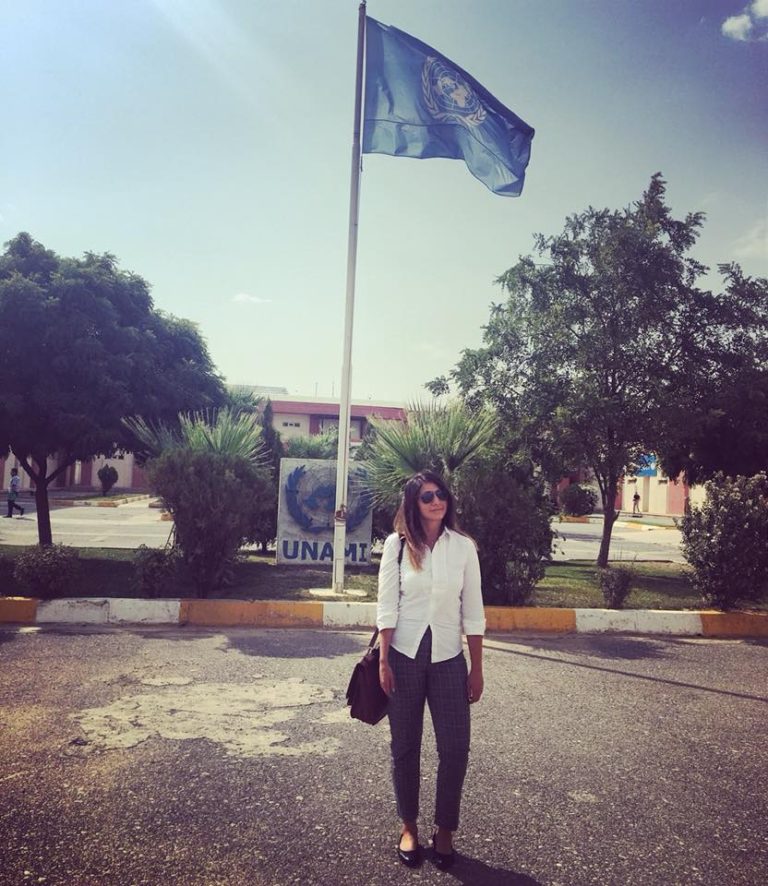
Overview:
I was asked by Catalysta’s client organization SPARK to undertake a project scoping, eco-system analysis, and needs inquiry in Iraq. My combined Middle East and North African policy, security, and linguistic expertise and my conflict area development and research background made me an ideal candidate to take on this mission. The case of Iraq is incredibly complex. Therefore, this case study has been broken down into a three part series, each part exploring one city I visited. This is Part I: Erbil, Kurdistan Region of Iraq (KRI) — The Challenge of Refugees and IDPs Becoming Permanent Residents.
The purpose of my inquiry mission was to explore the needs, opportunities, and feasibility regarding the upscaling and expansion of SPARK programs from the northern Kurdistan Region to the rest of the country. I combined a needs assessment with an eco-system analysis and visited a total of 59 stakeholders. These included local, regional, and national governmental representatives, local and international NGOs, private industry and business associations, startups, higher educational institutions, and potential beneficiary groups (entrepreneurs under the age of 35).
As part of this mission, I was asked to connect with high-level stakeholders at various levels of government on my own, due to the overstretched capacity of the client. I organized my individual meetings, developed networks of contacts for outreach, and coordinated all security and logistics alongside my team at Catalystas in order to prepare for my trip to what the US State Department considers one of the most dangerous countries in the world. Before I knew it, I was on my way to Erbil. Over the span of 13 days, I traveled through Erbil, Mosul, and Baghdad in order to gather enough information to deliver a comprehensive report to Spark filled with insights into new program and partner opportunities. As per Spark’s request, I focused on opportunities in the fields of SME development through local partners, youth entrepreneurship, and employment activities for refugees living in the five states affected by the ongoing conflict in Syria and Iraq.
The biggest challenge for the Catalystas team on this mission was examining the complex nature of business development in Iraq, and discovering the perfect path for Spark to expand its work in such a way that its projects become interwoven into the very fabric of Iraq’s economic structures. Every city I visited had a different story, different needs, and different abilities, but everywhere remained inextricably linked to the long-lingering centralized system of governance.
The Kurdish Region of Iraq (KRI)
I quickly discovered that it was, and is, imperative that any organization wishing to enter Iraq takes a micro-to-macro perspective regarding the projects they want to implement. In conducting this mission, three main points became crystal clear with regards to working in the Iraqi context. First, there is no way to do any project in Iraq without the blessing of the respective ministry in charge of whichever sector or group is targeted by the project. Second, working in Iraq is impossible without an understanding of the complex ethno-religious and political divides that affect the project target groups. Knowing how to form the right alliances and connections in order to overcome these tensions and complexities is crucial. Third, there is both a moral and ethical obligation on the part of organizations wishing to enter Iraq to create a viable exit strategy prior to entering the country. Iraq is suffering from severe “NGO fatigue”, a result of years of projects designed to fill gaps made by the central government only in the short term. These temporary projects may ease a situation in the immediate, but in the long term, they suck up funding and opportunities to find sustainable solutions and allow for high impact government uptake.
Only one year after the liberation of the northwestern provinces from the Islamic State, Iraq remains economically, politically, and infrastructurally devastated. While the Peshmerga, the military in the Kurdistan Region, was one of the fiercest forces in pushing back the Islamic State and received much funding and support from the coalition forces, including the United States and Germany, that support has dwindled. However, the need for support has not. With a broad community of refugees and internally displaced peoples (IDPs) now making their homes in the KRI, support for security measures and basic infrastructural development remains desperately needed. Syrian refugees and Iraqi IDPs alike have poured into the KRI due to the level of security provided by the Peshmerga, as well as the legal rights and economic opportunities available to them. Of course, this has put a massive financial strain on the Kurdistan Regional Government (KRG), which, coupled with the 2014 financial crisis in which the central government made severe cuts to The budget allocated to the KRG, has cost the KRG billions of dollars. This dire economic situation was further exacerbated by the independence referendum held by the KRI in September 2017, which did not gain international support and resulted in severe backlash, both economically and politically, from the central government in Baghdad, which did not recognize the vote.

The atmosphere I entered was once of begrudging dependence; it felt as though I was dealing with two separate countries in a tenuous truce. Although the KRI is more organized in its governmental system and delivery, the region still suffers, like the rest of Iraq, from a post-socialized mentality resulting from the Saddam era. As a region and a country as a whole, there is still an expectation and desire for one centralized political figure to provide all services. In addition to this administrative structural challenge, one of the most significant hurdles that the KRI and Iraq must overcome is the collection of socio-cultural norms that have proven detrimental to entrepreneurial progress. However, this sort of cultural shift can take years to bear true results, as it requires not only a change in governmental and business processes, but also in the minds of the people. The most effective way to begin manifesting these shifts is by working with youth.
Spark has had a country office in the KRI since 2014, when they entered Iraq alongside the waves of Syrian refugees fleeing the war during the peak of the violence and the rise of the Islamic State in Syria. Iraqi Kurdistan now houses over 97% of Syrian refugees, the vast majority of whom are ethnically Kurdish. They were welcomed openly by the other Kurdish ‘motherland territories’. Accordingly, Spark’s KRI office has focused in particular on higher educational opportunities for these refugees, creating scholarships and internships designed to support Syrians in their preparations to return to Syria without creating too heavy of a burden on local host communities in the meantime.
Of all the countries I have worked in surrounding the outbreak of the Syrian Civil War – thus far including Israel, Jordan, Lebanon, Syria, Iraq, and Turkey – the Kurdistan Region of Iraq has by far the strongest legal support for Syrian refugees. Under both KRI and central Iraqi law, Syrian refugees are allowed to register and obtain legal status, entitled to attend public schools, authorized to open businesses, and granted access to the public healthcare system. In Erbil, the systematic integration isn’t the problem; the biggest issue is the lack of governmental capacity and funding to continue support for the massive number of people who have flooded into KRI territories. This is exacerbated even more by the fact that the central government has not disbursed the KRI’s portion of the government budget since the September 2017 referendum.
From my external analysis on this scoping mission, I concluded that Erbil and the rest of the KRI are first and foremost in need of financial support. This is imperative for the continued support of both host and refugee communities through emergency relief and long-term assistance. Secondly, the KRI is in need of assistance when it comes to the sustainable integration of IDPs and refugees through post-conflict development programs. This help is necessary to ensure long-term positive progress in the KRI, rather than a long-term drain of the semi-autonomous region’s resources.
Currently, only 37% of refugees are living inside camps; the remainder have found housing in cities and are returning to work, with the support of subsidies from international donors. Now, the biggest question hanging over the future of the region is whether or not these communities will return home when the time comes. From what I have gathered, the majority aim to stay. In addition to the refugee communities hoping to make the KRI a permanent home, 35% of the region’s population is now comprised of IDPs, most of whom have no intention of returning to the largely unstable, dangerous, and underserved areas of Iraq. Cities such as Najaf and Anbar are struggling with destabilization and a lack of social services and general support, making it unlikely that IDPs in the KRI will choose to leave anytime soon.

One thing is for certain: the longer refugees and IDPs stay in the KRI, the more likely they are to become permanent residents.
Therefore, the challenge becomes not how to return them, but how to integrate these new members of society in such a way that they do not simply become a burden to their host communities. Instead, they must be included in a way that allows them to contribute to the multicultural atmosphere of business and culture that Kurdistan is so proud to have cultivated.
At the moment, the number of job opportunities in the KRI is minimal for all communities. This is due to a number of factors which have caused a long-running financial crisis, topped off by the 2017 referendum. Therefore, IDPs who do manage to find work often find themselves trapped in low-skilled fields such as construction or casual work in agriculture or restaurants. The IRC has stated that IDPs with education may be able to find jobs with NGOs, but the number of jobs in this area is low. Taking this situation into account, it became clear through my interactions and meetings with locals, IDPs, refugees, and stakeholders that promoting entrepreneurship in Iraq is ideal. Furthermore, I found that both host communities in the KRI and Syrian youth had very positive outlooks on entrepreneurship and the idea of setting up their own businesses. Refugees often prefer self-employment and purposefully pursue a diverse set of livelihood activities. This provides them with a steadier income and increased resilience against shocks experienced by the economy. However, in the current environment, these communities lack the knowledge and education necessary to create genuinely market-driven SMEs which would serve niche markets, be cost-competitive for consumers, and provide a healthy profit for youth.
In Catalystas’ overall analysis of the situation in Iraq, and in Erbil and the KRI in particular, we determined that our client Spark’s desired focus on development in conflict situations, rather than an emergency response approach, is perfect for the current environment in the KRI. The projects and programs Spark wishes to pursue are of a nature that will enable long-term growth for various communities in Kurdistan. I met with a variety of potential partners and stakeholders, including coding boot camps, women’s empowerment groups, and local municipalities, all of whom were willing and able to work together in order to make these programs a reality. With these insights and new networks along with an in depth security and risk analysis, overview of the legal groundwork, and investigation of the overall ecosystem, I and my team provided Spark with exactly the information they needed. Now, they are properly prepared to take the next steps and integrate their work into the sphere of refugee/IDP response and relief in the KRI with respect to other local and international organizational efforts.
Not only did Catalystas find significant opportunities for Spark, but we also determined that there is already an existing framework for service delivery regarding both emergency aid and development support. However, this framework has significant gaps, which provide organizations such as Spark with the perfect opportunity to support KRI communities through developing capacity and modernizing standards of delivery, PM&E, advocacy, and sustainability practices. With the combined gaps in this framework and the number of refugees and IDPs legally entitled to Iraqi/KRI governmental support, there is a multitude of fantastic opportunities for Spark and other NGOs to not only assist vulnerable populations with their immediate needs, but also to rehabilitate and modernize a system which could once again provide invaluable job placement services and economic progress programs.
If your organization is interested in starting or upscaling its work in the Kurdistan Region of Iraq, don’t hesitate to reach out to our team!
Don’t forget to read the other case studies for Iraq and this mission:
Catalystas Consulting, Lange Voorhout 43, 2514 EC Den Haag, The Netherlands
© Catalystas Consulting. All rights reserved. Privacy and Policy
An Iranian-American with more than ten years of experience in international relations, economic development, and political empowerment, Beatrice is heavily invested in making the world a better place. Her work spans multiple regions of the world, often including high-risk environments, and her clients include non-governmental organizations, governmental bodies, and small-to-medium–sized corporations throughout the US, EU, Middle East, and Sub-Saharan Africa.
Originally focused on the areas of economic development, security, and disarmament, Beatrice turned to the humanitarian field, where she has expanded her expertise to include international security policy, gender equality, and innovation planning. She is a highly skilled grant writer, program designer, auditor, and capacity and impact assessor, as well as an authority on client and donor relations and ethical corporate engagement strategy.
Her personal and professional interests come together in the use of technology and data to provide solutions and insight into human rights, higher education, sexual reproductive rights, and environmental preservation.
We built Lysta as an answer to one of our own problems: the need to quickly assemble teams of experts across various subject matter, geographic, linguistic, and thematic areas for projects and proposals as they arise. We quickly realized that we were not the only ones facing this challenge! With the speed that development projects require hiring, turnaround, and technical insights, we see first hand how helpful it is to have a ready-made database of vetted experts to call on.
For existing and potential Clients, you can access all consultant full profiles by signing up here as a client for free.
For consultants, adding your profile to Lysta means jumping to the top of the list for our clients in recruitment processes. We do the heavy lifting: the CV reviews, interviews, vetting, and personnel management; so when our clients come to us, they know they’re hiring someone they can trust to deliver high quality, timely results. Click here to add your profile for review.
We’re proud to be a link in the chain that connects the best of the best – don’t hesitate to reach out and see how you can put Lysta to work for you!